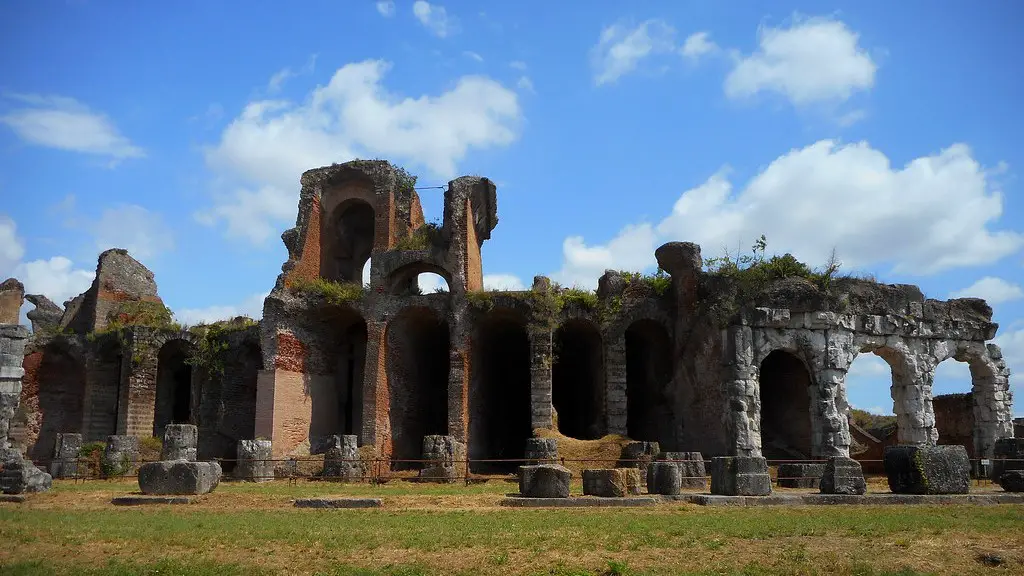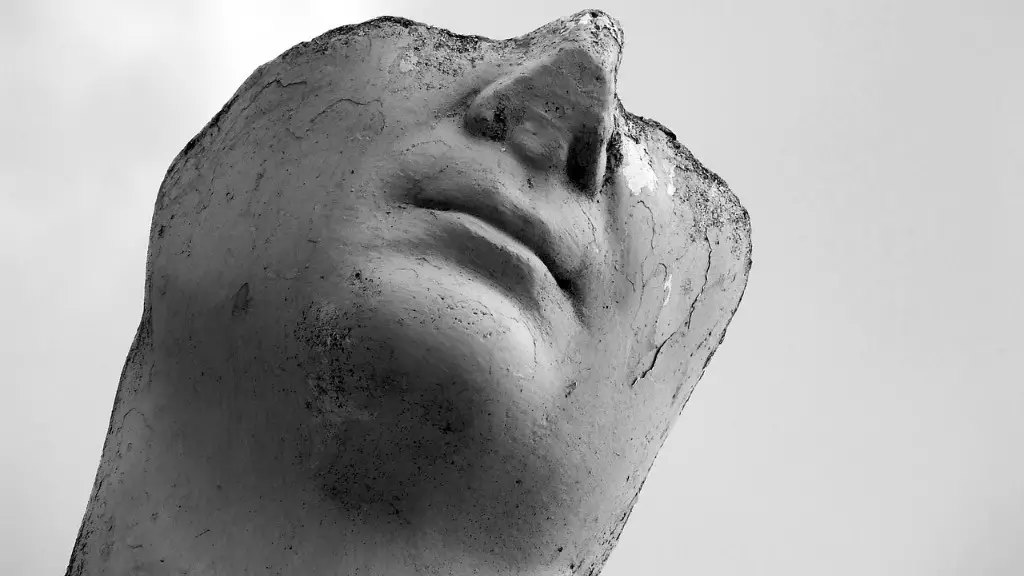During the 8th century B.C., the Roman state was forged from a multitude of small villages and settlements that existed along the banks of the Tiber River. As their territories expanded, the Romans encountered various social and political problems that eventually led them to decide to become a self-governing nation.
The motivation behind the Romans’ decision to govern themselves was a need to gain control over the rapidly changing circumstances they were facing internally and externally. As the Roman people grew in population, its resources and institutions became increasing strained. This prompted the Romans to develop a system of governance which would be more efficient than what the previous villages and settlements had in place.
They could have looked to a neighboring kingdom and adopted their political systems, but the Romans ultimately chose to experiment with their own rules and systems, which they believed would be better tailored to their needs. They fundamentally sought independence from other states and the freedom to make their own decisions. To achieve this, they created an assembly to meet and discuss local matters and appointed a magistrate who would be responsible for upholding the law.
The Romans also held a special civic virtue in high regard—the notion of a shared responsibility in the government and common citizens had a say in public policy. Over time, their representatives would discuss the latest foreign policy moves and domestic challenges, and citizens would respond with praise or criticism of proposed solutions. This common attitude of involvement and accountability among the people, unheard of in the ancient world, was an integral factor in the capacity of Rome to build an effective and responsive government.
The early Roman Republic was also relatively egalitarian, in stark contrast to the oppressive authoritarianism that was common then. The citizens had a say in how the government should be run, through their assembly and through the election of magistrates. Every man was considered to be equal before the law and this meant that the government could be consulted fairly while differences in opinions and background could be addressed. This idea of fair procedure and equality under the law, coupled with collective action and unified aims, was invaluable in Rome’s success in governance.
Finally, the founding of the Roman Republic also emphasized the importance of collective goals. Through the organization of the assemblies and the election of magistrates, the citizens created a stable government based on shared objectives and limitations on power. This helped to create a strong, unified state that could ward off external threats as well as forge a shared culture and identity among the Roman citizens.
The Power of the Roman Republic
The early Roman Republic was surprisingly powerful for its time. The sheer size of the Roman Empire, which encompassed the entirety of the Mediterranean and beyond, was unprecedented in the ancient world and it was enabled by the vast and unified administrative apparatus that the Romans had established. The Senate and the assemblies acted in concert to create and oversee monumental public works such as the Colosseum and innovative technology such as aqueducts and roads that were essential in the daily life of the citizens.
The Roman Republic also adopted a foreign policy of expansion to empower itself. Rome’s reach extended beyond the Mediterranean, into North Africa and what is now modern-day France. The Romans were aware of the potential of their ambitious agenda and were willing to become a superpower in the ancient world to attain greater stability and strength. Therefore, the Roman Republic embarked on an ambitious mission to conquer new territories and arrogantly asserted their power and authority.
The strength of the Roman Republic was also deeply connected with its hierarchical administrative structures. The government was divided into two consular offices – the consul and the praetor. The consul was the highest office, responsible for the administration of the state, and the praetor was in charge of foreign relations, assisted by the Senate. This arrangement provided Rome with a flexible and effective government that was able to both fend off foreign threats from enemies and respond swiftly to domestic concerns of its citizens.
Successful Incorporation of Greek Ideas
The Roman Republic was also able to incorporate elements of Greek culture and government into its own. Greek political thought has long been seen as one of the key factors in the emergence of self-governing cities in the Mediterranean. By adopting elements of Greek philosophy, the Roman Republic was able to create an effective system of governance on its own terms.
The incorporation of Greek ideas into the Roman Republic’s governing structure proved to be correct. For example, a cornerstone of the Roman Republic was the concept of checks and balances between different branches of government, which was adapted from the concept of a mixed constitution as outlined by Plato and Aristotle. This allowed the Roman Republic to form a government which was both protective of the public interest and antagonistic to the emergence of any oppressive regime.
Another example is the introduction of the concept of participatory democracy into the Roman Republic. This was unprecedented in the ancient world and enabled Roman citizens to become directly involved in their government, influencing its decisions through their representatives in the assemblies and Senate. This also provided a platform for different voices and opinions to exist in the Roman Republic, creating a space for constructive dialogue which was at the core of Rome’s successful government.
Scandal and the Fall of Rome
Despite the strengths of the Roman Republic, it eventually fell due to a number of scandals that plagued the government. A series of events, including the murder of a consul and corruption in the Senate, resulted in a series of civil wars that ultimately led to the defeat of Rome by the rival forces of Pompey and Julius Caesar.
The scandalous state of affairs in Rome’s government was ultimately a result of the Roman Republic’s own successes. Having achieved its aims of increasing stability and strength, the Roman system of government became increasingly rigid and inflexible in order to ensure the preservation of these gains. This created a system that was powerless to respond to external threats, while those in power became blind to the needs of the people.
What’s more, the Roman Republic had moved away from the ideals of the early Republic and increasingly became a tyrannical regime dominated by a single ruler, who essentially ran the government according to his own whims. As a result, citizens were unable to hold their rulers accountable, bred resentment and ultimately led to the end of the Roman Republic.
Triggering Factors of Government Change
The Roman Republic had undergone a remarkable transformation in its lifetime, from a small, rural society to a powerful imperial state. This transformation was not without its challenges and the Romans had to take certain steps to ensure the government could remain effective in the face of these challenges.
One such triggering factor was the increasing complexity of the Roman Empire, which saw the population and area of the state rapidly increase. This led to the need for a more unified form of government that could respond to this rapid growth. In order to do this, the Romans created a centralized state administration, which was divided into various branches that each had their own duties.
The civic virtue of the Roman people was also a key factor in their success in terms of self-governance. The Roman people were willing to cooperate and take a common stand in tackling their internal and external problems. This collective spirit allowed the Romans to institute their own set of rules, which were effective in maintaining order and stability in the state.
Finally, the incorporation of Greek theories of democracy into the Roman Republic was essential in providing the people of Rome with an effective government. The Greek theories of democracy were tailored to the local conditions in Rome, ensuring that the voices among the people were heard and their votes counted.
Roman Legacy in the Present Day
The legacy of the Roman Republic still lives on to this day. We can still find remnants of the Roman Republic in our institutions and culture, from the Senates of modern Europe to the Olympic Games. What’s more, Roman ideals such as fairness and equality still bring together citizens in societies around the world as we seek to create a more just and equal society for all.
The implementation of checks and balances between different branches of government has also been closely followed by other countries, including the United States. This idea, which was central to the Roman Republic, has enabled governments to better serve the needs of its citizens while preventing the abuse of power.
The concept of law, which was incorporated by the Romans, has also been carried over to modern society. This idea of legal universalism, which states that all people should be subject to a single, uniform set of laws, was unheard of in the ancient world, but has since become a cornerstone of justice in our own societies.
Finally, participatory democracy, which was introduced in the Roman Republic, is still alive in the present day. The idea of citizens directly participating in the decision-making process of their governments has become commonplace in modern times, whether through voting, marches, or protests. This concept is integral for citizens to have their voice heard and for all societies to progress.
Impact of Roman Innovations
The innovations that the Romans brought to the ancient world have had a lasting impact on our modern society. From public works such as the Colosseum and aqueducts, to their legal system and foreign policy, many of these innovations have allowed our own societies to thrive.
Technological advancements such as the introduction of pavement into roads allows for faster and safer transportation, while the utilization of water-powered mills to aid industrial production has enabled the rise of industries such as agriculture and manufacturing. The innovations in government such as the adoption of checks and balances and the introduction of participatory democracy allow people to have a say in the decision-making of their governments, while the expansion of the Roman Republic’s reach introduced new technologies and ideas from foreign lands to Rome and the western world, which continue to shape our world today.
The Roman Republic’s many successful innovations also benefited not only the Romans and their contemporaries but also generations yet to come. The impact of the Roman Republic can be seen in the influence it had on the modern world, with its political systems, architecture, and technology still inspiring people today.
Why Did the Ancient Romans Decide to Govern Themselves?
The Romans’ decision to become a self-governing nation was driven by a need to protect their collective interests and gain greater control over their internal and external affairs. This led to the Romans adopting their own ideas of a republic and incorporating key elements of the Greek model of democracy.
The Roman Republic was remarkable in its time; it was the first state in the ancient world to be largely egalitarian and gave its citizens a say in the government. This, coupled with its hierarchical structures, foreign policy of expansion, and incorporation of Greek philosophy, strengthened the Roman Republic and enabled it to become a superpower.
Although the Roman Republic ended due to a series of internal and external scandals, its legacy still lives on in the present day. Innovations such as the concept of checks and balances, legal universalism, and participatory democracy have been widely adopted by modern societies, while Roman public works and technological advances have allowed us to make significant progress in many areas. Ultimately, the Romans’ decision to self-govern was a wise one and it has left an indelible impression on how we conduct ourselves today.


